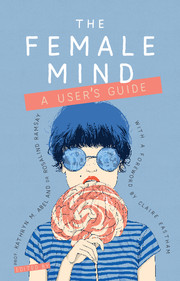Book contents
- Frontmatter
- Acknowledgements
- Contents
- Foreword
- Introduction: being female
- Part I Women in perspective
- 1 The history of the ‘female mind’
- 2 Gender-informed responses to women's distress
- 3 Female sexuality
- 4 Growing up female
- Part II Women and society
- Part III Women and their environment
- Part IV Women and specific disorders
- Part V Women and treatment
- Contributors
- Index
2 - Gender-informed responses to women's distress
from Part I - Women in perspective
Published online by Cambridge University Press: 02 January 2018
- Frontmatter
- Acknowledgements
- Contents
- Foreword
- Introduction: being female
- Part I Women in perspective
- 1 The history of the ‘female mind’
- 2 Gender-informed responses to women's distress
- 3 Female sexuality
- 4 Growing up female
- Part II Women and society
- Part III Women and their environment
- Part IV Women and specific disorders
- Part V Women and treatment
- Contributors
- Index
Summary
Karen's story
Karen is 27 years old and has been in close contact with mental health services since she was 13. She has been an in-patient for extended periods of time and has had four care coordinators in the past year. Karen was homeless prior to her last admission and will leave hospital when there is suitable accommodation for her.
Over the years, Karen has been variously diagnosed with borderline personality disorder, emotionally unstable personality disorder and psychosis. She has been treated with a range of medications, including antipsychotic medication. Staff call her ‘attention seeking’, as she often seeks support, though her named nurse describes her as ‘muddled and confused’. Karen uses alcohol heavily and has been known to go missing from the ward, returning in a distressed state. Once, the clinical team was concerned that she might be pregnant. She self-harms frequently, often requiring treatment by accident and emergency (A'E) services; staff get frustrated and think this is a way of getting attention, describing her as ‘manipulative’. Karen has difficulty sleeping and has confided in night staff that her voices tell her she is a bad person, a ‘fat slag’ who should harm herself and does not deserve to live. Karen says that she hates herself, feels she is being punished and that cutting herself gives some relief from the bad feelings and frightening voices.
Her physical health is poor; she eats badly and struggles to take care of herself. She has unstable diabetes, experiences frequent headaches and stomach pain, and asks staff repeatedly for medication.
Detailed information about Karen's earlier life is buried in her extensive records, and those staff who have gathered some of this knowledge are very uncertain about what to do to help; they don't give her opportunities to talk about difficult experiences she had, fearing this could add to her distress. When Karen was a child, her stepfather sexually abused her over many years, which was known in her family; her attendance and attainment at school were poor; as a teenager she joined gangs where drinking and drug-taking were common. She became pregnant at 15 and her baby was given up for adoption – nothing is recorded about the baby's father and there is a possibility it was her stepfather's. The loss of her baby distresses her greatly; she only speaks about him after drinking heavily.
- Type
- Chapter
- Information
- The Female MindUser's Guide, pp. 14 - 18Publisher: Royal College of PsychiatristsPrint publication year: 2017



